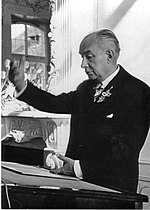Alexander Rüstow
Appearance
Alexander Rüstow | |
|---|---|
 Rüstow c. 1960 | |
| Born | 8 April 1885 |
| Died | 30 June 1963 (aged 78) |
| Nationality | German |
| Academic career | |
| Field | Macroeconomics |
| School or tradition | Ordoliberalism Neoliberalism[1] |
| Doctoral advisor | Paul Hensel |
| Influences | Parmenides · Oppenheimer |
| Contributions | Social market economy |
Alexander Rüstow (8 April 1885 – 30 June 1963) was a German
Social Market Economy" that shaped the economy of West Germany after World War II. He is the grandnephew of Wilhelm Rüstow, the grandson of Cäsar Rüstow and the father of Dankwart Rustow
.
Life
Rüstow was born in
German Army
.
After the war, Rüstow, then still a
Ruhr Area. Disillusioned with socialist planning
, he started working for the VdMA, the German Engineering Federation in 1924. The engineering companies in Germany suffered much by the protected and subsidized coal and mine industry.
In the 1930s, the climate in
University of Istanbul, Turkey. In Istanbul, he worked on his magnum opus, Ortsbestimmung der Gegenwart (in English published as Freedom and Domination), a critique of civilization. In 1938 at the Colloque Walter Lippmann, it was Rüstow who created the term 'neoliberalism' to separate new liberalism from classical liberalism. Rüstow promoted the concept of the social market economy, and this concept promotes a strong role for the state with respect to the market, which is in many ways different from the ideas which are nowadays connected with the term neoliberalism.[2]
In 1949, Rüstow returned to Germany and obtained a chair at the
University of Heidelberg
, where he remained until his retirement in 1956. He died in 1963 at age 78 in Heidelberg.
Ordoliberalism
| This article is part of a series on |
| Conservatism in Germany |
|---|
 |
Together with Walter Eucken, Wilhelm Röpke and Franz Böhm, Rüstow provided the necessary foundational work of Ordoliberalism.
Work
- Der Lügner. Theorie, Geschichte und Auflösung des Russellschen Paradoxons, 1910 (thesis)
- Schutzzoll oder Freihandel?, 1925
- Das Für und Wider der Schutzzollpolitik, 1925
- Das Versagen des Wirtschaftsliberalismus, 1945, Republished in 2001, ISBN 3-89518-349-0
- Zwischen Kapitalismus und Kommunismus, 1949
- Das Versagen des Wirtschaftsliberalismus, 2nd edition, 1950
- Ortsbestimmung der Gegenwart. Eine universalgeschichtliche Kulturkritik, ("Determination of the Present's Location"), 3 Volumes, 1950–1957
- Volume 1: Ursprung der Herrschaft ("Origin of Rule")
- Volume 2: Weg der Freiheit ("March of Freedom")
- Volume 3: Herrschaft oder Freiheit? ("Rule or Freedom")
- Wirtschaft und Kultursystem, 1955
- Die Kehrseite des Wirtschaftswunders, 1961
References
- ^ Not to be confused with the later Anglo-American meaning of the word
- ISSN 0039-3606
Further reading
- Attanasio, Salvator, ed. (2016). Freedom and Domination: A Historical Critique of Civilization. Princeton University Press. ISBN 9780691642949. A condensed translation of Alexander Rustow’s three-volume Ortsbestimmung der Gegenwart.
- Nicholls, A. J. (2000). Freedom With Responsibility: The Social Market Economy in Germany, 1918–1963. Oxford: Oxford University Press.
